It's all about the classical music composers and their works from the last 400 years and much more about music. Hier erfahren Sie alles über die klassischen Komponisten und ihre Meisterwerke der letzten vierhundert Jahre und vieles mehr über Klassische Musik.
Total Pageviews
Tuesday, January 17, 2023
While My Guitar Gently Weeps (Taken from Concert For George)
UP Concert Chorus celebrates 60 years with concert on Feb. 4
by Manila Bulletin Entertainment

The University of the Philippines’ performing group, the UP Concert Chorus (UPCC) or simply Korus, celebrates its 60th anniversary with a concert entitled “Sama-Sama Together” to be held on Saturday, Feb. 4, 5 pm at the UP Theater in Diliman, Quezon City.
Established in 1962 under the incumbency of UP President, General Carlos P. Romulo with Dean Ramon Tapales as UPCC’s first conductor, the UPCC has evolved into an internationally renowned and multi-awarded choir that has perfected versatility in singing classical, folk, pop and Broadway musical genres with their signature vibrant choreography under the stewardship of the much-beloved Dean Rey T. Paguio.

An icon of stage performance that pioneered ChoreoCapella or choreographed a capella in the Philippines, it is the recipient of several distinctions, including the world’s best in folk choral performance at the 2012 Festival Internacional de Cantonigros in Spain, Grand Prix winner at the 6th International Krakow Choir Festival in Poland, and 2012 Aliw Awards’ Lifetime Achievement Award.
The anniversary concert features different UPCC batches from the 1960s to the present performing songs and choreography of various musical genres such as liturgical, classical, opera, Filipino folk, Broadway, and pop.

“From Thompson to Fettke, from Abelardo to Lucio San Pedro to John Lennon, from VST to APO Hiking Society, from Gary Valenciano to Itchyworms, from Nonong Pedero to Willy Cruz to Ryan Cayabyab… we are going sing the songs by these remarkable artists. The concert is going to be a musical extravaganza to remember 60 years by,” says Atty. Noriz Reyes, chairperson of the UPCC 60th Anniversary Concert Committee.
Three celebrated conductors will be leading the choir, they are: Prof. Joel Navarro, Prof. Ed Manguiat, and current UPCC conductor Jai Sabas-Aracama. Mr. Rico Mortel will be directing the show.

Among those who have confirmed to perform include singer-comedienne Nanette Inventor; Edru Abraham of Kontra Gapi; Becky Demetillo-Abraham of Inang Laya; broadcaster Kata Inocencio; celebrity voice teacher Kitchie Molina; Bob Serrano and Popo Suanes of the Tux; Zebedee Zuñiga and Sushi Reyes of Opera; lawyers Dot Gangcayco, Noriz Castillo, Gigi Dizon Reyes and Jenny Aldecoa-Delorino; doctors Tony Comia and Melfred Hernandez; international performer Jonathan Badon; stage actors Lionel and Cynthia Guico; Filipino-American musician Nhick Pacis; singer-actress Olive Isidro; speech language pathologist Kaye Tuiseco of the Ryan Cayabyab Singers, music teacher Emmy Cayabyab; public relations strategist Ritzi Ronquillo; Vallejo City Vice-Mayor Rozzana Verder-Aliga of California, and around 200 more UPCC alumni.
ADVERTISEMENT
Prof. Joel Navarro, himself a UPCC alumni, promises that the event will be a treat not just for those who are familiar with the UP Concert Chorus’ brand of performing. He says, “It’s a lifetime event that you will want to attend. It’s not just our story. It’s the story of how music can build a community, transform a people and move the world.”

UPCC Alumni Association President Atty. Dot Gancayco stresses that as their way of giving back to the Alma Mater the Korus, the proceeds of the concert will go to the Dean Rey T. Paguio Scholarship Fund.
For ticket details and inquiries, contact Lowell Reyes mobile 09228050471.
Monday, January 16, 2023
I Dreamed a Dream (From "Les Misérables")
La Belle Dame Sans Regrets
Iniibig Kita
Waldteufel - Valse des patineurs
Sunday, January 15, 2023
Hold Me in YOur Arms Teddy Pendergrass and Whitney Houston!!
Offenbach - Orpheus in the Underworld Overture
A Brief History of Clementi, the Underrated Innovator His Music and His Life)
Friday, January 13, 2023
The Father of Piano: Muzio Clementi
by Fanny Po Sim Head, Interlude
Background as an Organist and Performer
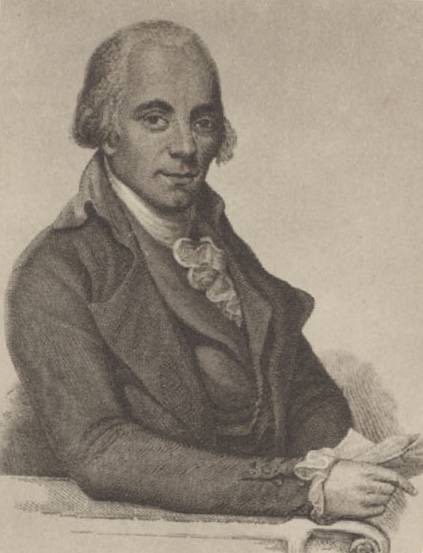
Muzio Clementi
Born in 1752, Italian composer Clementi showed his musical talent at an early age. Not only did he begin composing and writing an oratorio at the age of 13, but he was also hired as an organist of the parish church of San Lorenzo in Dámaso. However, he didn’t work for the church for a long time. Instead, in 1766, he was taken to England by Sir Peter Beckford. The following seven years, Clementi stayed at one of Beckford’s estates, Stepleton House, where he gave his first public performance. The performance was successful, and the audience was impressed with his playing.
His Encounter with Mozart
Clementi left the estate when he turned 22 years old. His reputation as a performer quickly developed as he toured around London and later all over Europe. When he was in Vienna in 1781, he was invited by Holy Roman Emperor Joseph II to contest with Mozart. The composers were asked to improvise and perform excerpts of their works. Even though the contest was declared a tie, Mozart and Clementi had very different impressions of each other. Clementi was impressed by Mozart’s performance. One of Clementi’s students, Ludwig Berger, recalled what Clementi said of Mozart:
“Until then I had never heard anyone play with such spirit and grace. I was particularly overwhelmed by an adagio and by several of his extempore variations for which the Emperor had chosen the theme, and which we were to devise alternately.”
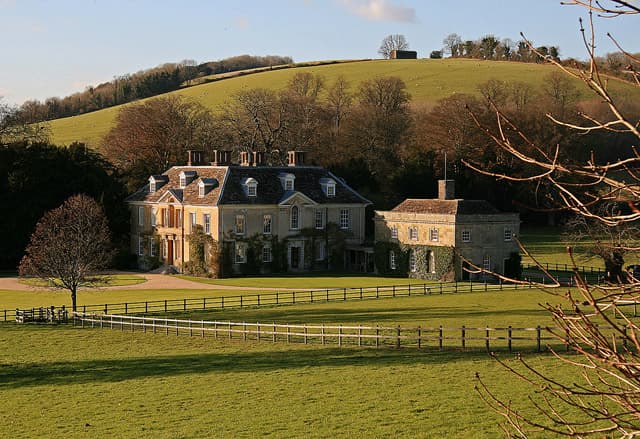
Stepleton House
However, Mozart was not impressed by Clementi’s playing at all. In one of his letters to his father, Mozart mentioned that Clementi’s playing was a “mere mechanic” and
“Clementi is a charlatan, like all Italians. He marks a piece presto but plays only allegro.”
Although Mozart remained negative of Clementi, Clementi was influential to many composers and pianists even to this day. On the other hand, Beethoven looked highly upon Clementi and his compositions. He encouraged his nephew, Karl van Beethoven, to learn Clementi’s works. Beethoven said, “They who thoroughly study Clementi, at the same time make themselves acquainted with Mozart and other composers; but the converse is not the fact.”
The “Newer School of Technique on the Piano”
Clementi has been known as the “Father of the Piano.” Through his 110 piano sonatas, Clementi expanded and showcased the capabilities of the pianos, as well as exhibited many virtuosic passages and demanding skills required to execute his works.
Ignaz Moscheles once wrote that Clementi founded the “newer school of technique on the piano.” Moscheles was among one of the students of Clementi. Others included Johann Baptist Cramer, Therese Jansen Bartolozzi, Johann Nepomuk Hummel, Ludwig Berger (teacher of Felix Mendelssohn), and John Field.
Influences on the History of Piano-Making
This Father of the Piano influenced piano history in more than just as a composer, a performer, and a pedagogue. Clementi was also known as a clever businessman. Clementi was involved in both music publishing and piano manufacturing. In 1798, when he was 45 years old, he took over Longman and Broderip and began a publication line, “Clementi & Co., & Clementi, Cheapside.”
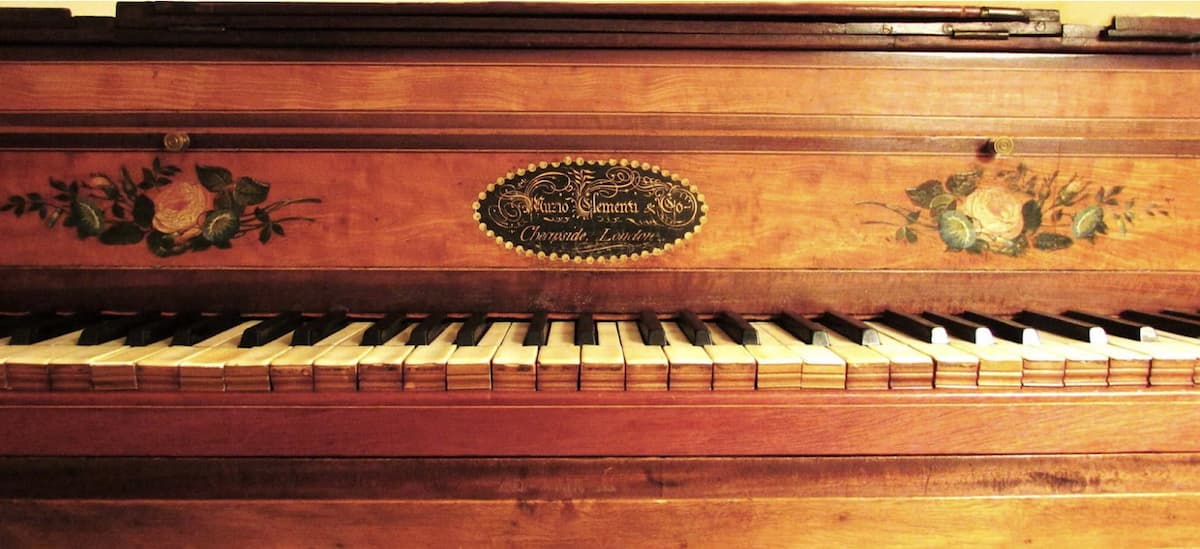
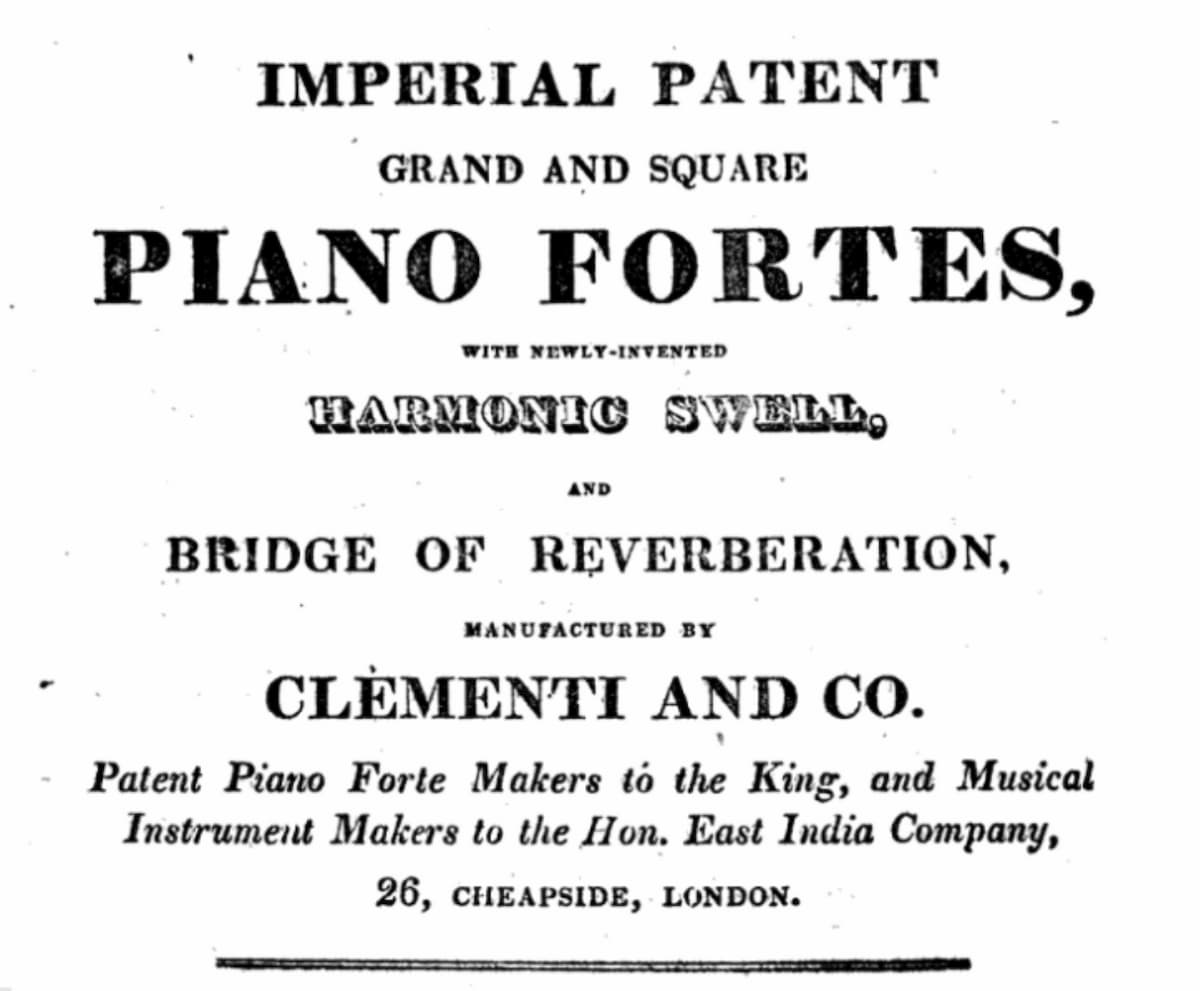
Clementi brought significant improvements to the design of pianos, and many remained the piano standard. In 1810, Clementi almost completely stopped performing and devoted most of his time to composing and piano making. One of his last compositions, Gradus ad Parnassum, is a set of 100 studies published in 3 volumes. The studies are short but cover both technical and interpretative skills that deserve more attention from piano lovers.
Besides Gradus ad Parnassum and the 110 piano sonatas, Clementi’s Capriccios are equally charming. His output of Capriccios spanned over his career, and among them, the two Capriccios in op.34 display many expressive and improvisatory elements in Clementi’s music. lementi, a legendary performer, composer, educator, publisher, and piano manufacturer, lived a prolific life and is well deserved to be called the Father of Piano. Yet, he also was a conductor who founded the Philharmonic Society of London (which later became the Royal Philharmonic Society in 1912). He also wrote a few symphonies and chamber works, including Symphony No.3. It is nicknamed “the Great National,” and Clementi used God Save the King (National Anthem of the United Kingdom) in various movements.
Classical to Broadway: The Art of Robert Wright and George Forrest
by Maureen Buja
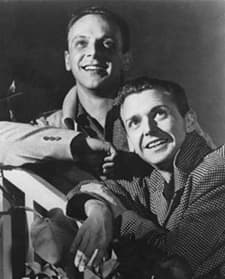
Robert Wright (1914-2005) worked with George Forrest (1915-1999) to bring classical music to the musical stage. Both men were credited as composer-lyricist, but George Forrest worked primarily on the musical side of things. Wright was born in Daytona Beach, Florida, and studied piano. He was active while in high school, working in vaudeville, played piano at a silent movie theater, and led his own orchestra. Together with George Forrest, they wrote the school song ‘Hail to Miami High’. This first collaboration would eventually lead to 16 produced stage musicals, 18 revues, music for dozens of films, and many club acts. After leaving high school the pair did a cross-country cabaret tour and eventually ended up in Hollywood, where they worked for MGM as songwriters for seven years.
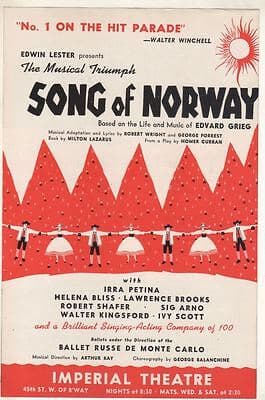
Song of Norway Poster
Their first Broadway production was Song of Norway in 1944, which took music from his piano concertos, from his violin sonatas, and many other sources.
Other music in the production can be traced to the source: ‘Prelude & Legend’ (based on Grieg’s Piano Concerto in A minor), ‘Now’ (based on Violin Sonata No. 2, and Waltz from Lyric Pieces, Book 2), ‘Strange Music’ (based on ‘Wedding Day at Troldhaugen’ from Lyric Pieces, Book 8), ‘Midsummer’s Eve’ (based on ‘I Walked One Balmy Summer Eve’ from Five Poems, Op. 26, No. 3 and Scherzo in E from Lyric Pieces, Book 5), and ‘I Love You’ (‘Ich Liebe Dich’, from Melodies of the Heart, Op. 5, No. 3).
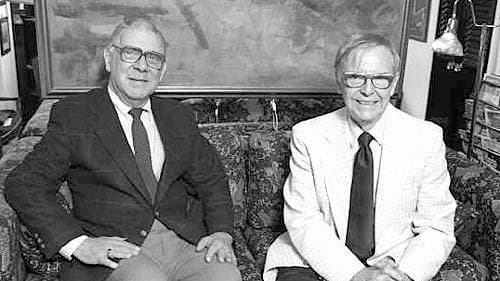
Wright and Forrest later in life
This 1944 operetta was a successful Broadway hit and was the first Broadway show to cross to London after the end of WWII, opening in 1945.
Next came Gypsy Lady in 1947, adapting music from two operettas by Victor Herbert, The Fortune Teller (1898) and The Serenade (1897).
‘Romany Life’ from The Fortune Teller, with lyrics by Harry B. Smith, was one of the songs that was used in the Wright-Forrest work.
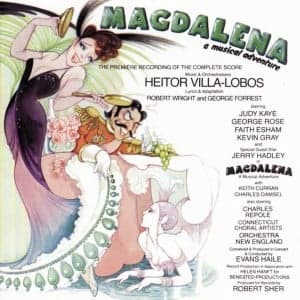
Magdalena Studio Recording 1990
In a shift from their usual method, the duo worked with a living composer, Heitor Villa-Lobos, on Magdalena: A Musical Adventure. The original book was by Frederick Hazlitt Brennan and Homer Curran, and then was given new lyrics and musical adaptations by Wright and Forrest. The New York Times gave it a scathing review, praising only Villa-Lobos’ music. It lasted for 88 performances.
In 1949 came The Great Waltz, which adapted the music of both Johann Strauss Sr and Jr. The original production opened on Broadway in 1934, to a book by Moss Hart and lyrics by Desmond Carter. That, in turn, was based on a pasticcio (an unauthorized adaptation of the music of one or more composers) by Erich Wolfgang Korngold and Julius Bittner called Walzer aus Wien, first performed in Vienna in 1930. In 1949, Wright and Forrest were asked to make their own adaptation for the Los Angeles Civic Light Opera. This never opened on Broadway but went to London in 1970.
Finally, in 1953 came Wright and Forrest’s great hit: Kismet. This used the music of Alexander Borodin to create songs that entered the pop music world, including ‘Stranger in Paradise’, ‘Baubles, Bangles and Beads’, and ‘This is my Beloved’.
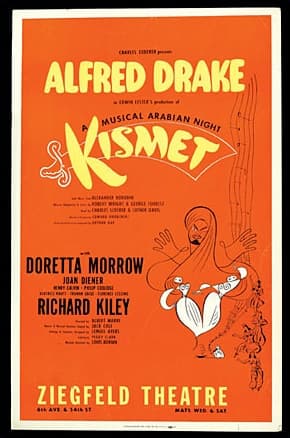
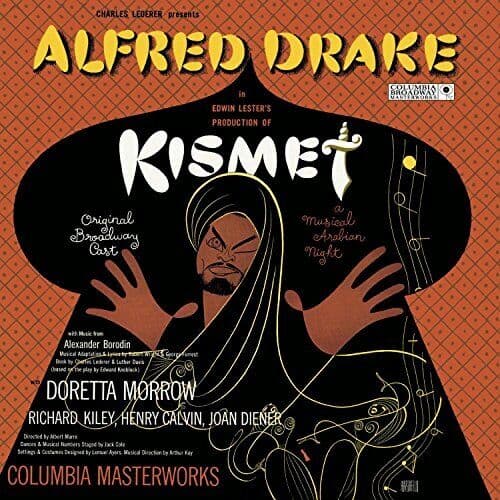
Kismet Poster 1953
Borodin’s String Quartet No. 2 was used for two different songs.
The women’s dance scene from Act II of Prince Igor, the Polovtsian Dances, was the basis for no fewer than 5 different pieces, the most famous of which was Stranger in Paradise, based on the ‘Gliding dance of the Maidens’ from the dance sequence.
As testament to the popularity of Stranger in Paradise was that in 1955, no fewer than 5 versions made it to the UK pop charts, including versions by Tony Bennett (No. 1), The Four Aces (No. 6), Tony Martin (No. 6), Bing Crosby (No. 17), Don Cornell (No. 19), and an instrumental version by Eddie Calvert (No. 14). It also charted in France as Étranger au paradis that same year. Since then, versions have been recorded by everyone from Engelbert Humperdinck to Sun Ra. Neil Young has performed it live but has never recorded it.
Kismet won 3 Tony Awards in 1954: Best Musical, Best Actor in a Musical (Alfred Drake as Hajj) and Musical Conductor (Louis Adrian). In 1995, Wright and Forrest were awarded the ASCAP Foundation Richard Rodgers Award.
Wright and Forrest’s last adaptation-musical was the music for Anya in 1965, adapting the music of Sergei Rachmaninoff. It closed while in previews when the critics denounced it as being too old-fashioned. It was a musical adaptation of the story of Anastasia, said to be the only surviving daughter of Emperor Nicholas II of Russia. The show was reworked many times, A Song for Anastasia (1967), The Anastasia Game (1989 and 1990), The Anastasia Affaire (1992), and Anastasia, the Musical (1998), but was never the international success that Kismet had been.
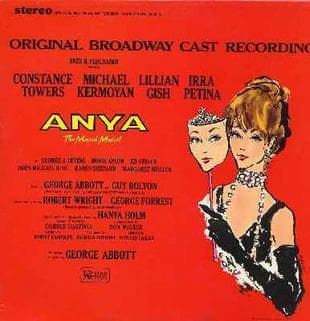
Anya Original Broadway Cast Recording
These shows are a testament to how differently classical music was heard in the early 20th century. We can see from various Warner Brother cartoons that classical music by Beethoven, Brahms, Chopin, Liszt, Rossini, Schumann, Smetana, Strauss II, and Wagner were all thought to be appropriate for cartoon usage as being known to the public. Wright and Forrest took their own knowledge of the by-ways of classical music and re-presented them with words and situations that perfectly caught the public’s taste in the case of Kismet.
Thursday, January 12, 2023
Joseph Rheinberger - his music and his life
Born: March 17, 1839 Vaduz Liechtenstein
Died: November 25, 1901 (aged 62) Munich Germany
Joseph Rheinberger, in full Joseph Gabriel Rheinberger, (born March 17, 1839, Vaduz, Liechtenstein—died Nov. 25, 1901, Munich, Ger.), German composer and teacher whose organ sonatas are among the finest 19th-century works for that instrument.
Rheinberger studied organ at Vaduz and became organist at the parish church when he was only seven years old. He later studied at Feldkirch and Munich and in 1867 became professor of organ and composition at the Munich Conservatory. Among his pupils were Engelbert Humperdinck, Ermanno Wolf-Ferrari, Wilhelm Furtwängler, and the American composers George W. Chadwick and Horatio Parker. Besides 20 organ sonatas, he wrote four operas and much church and chamber music. He received a title of nobility in 1894.
Josef Gabriel Rheinberger - Piano Concerto Op. 94 (audio + sheet music)
Is this music or can it be deleted?
The relationship between music and memory is powerful. Music evokes powerful emotions that then bring back memories. When we listen to a piece of music from years ago, we seem to travel back to that moment. We can feel everything as if we were there.
Our long-term memory can be divided into two distinct types, namely implicit memory and explicit memory. Explicit memory is a deliberate, conscious remembering of the past. Explicit memory involves things like textbook learning or experiential memories, things that must be consciously brought into awareness.
Implicit memories are our unconscious and automatic memories. For example, playing a musical instrument, or recalling the words to a song when someone sings the first few words. A large part of memory takes place in the unconscious mind.
Explicit memory fades in the absence of recall, while implicit memory is more enduring and may last a lifetime even in the absence of further practice. The explicit memory systems become damaged by conditions such as Alzheimer’s disease.
I remember my parent's irritation in their faces, such as a broken mirror! Once upon a time, we have been getting crazy while listening to our idols' sounds. In my case, sometime during the 1960s and 1970s.
I felt "satisfaction" while listening to the Rolling Stones or dancing to the Beatles. I had hectic dreams together with Pink Floyd or couldn't hold myself with "Da-da-da_ and its then "German New Wave which swapped to the world later on - yes, even up to the Philippines.
Today, we are the parents of the younger generation again. Is there diplomatic space for any discussions? What's the music up nowadays?
Rap or house? Or something like this? Noise, din, row, racket, fuss, or damage to my (?) musical paintwork?
I remember harmonic accords with flutes and my accordion. Later myself at the piano ... .
Two generations, even three meanwhile. Let's strike the right one - no matter which generation we belong to.
Shahram Heshmat, Ph.D., an associate professor emeritus at the University of Illinois at Springfield with a Ph.D. in Managerial Economics from Rensselaer Polytechnic Institute, describes it as follows: " In sum, music can help to unlock non-musical memories and promote communication in older adults with Alzheimer's disease. Recalling a memory is not always easy. It doesn’t simply come when you want to retrieve it. However, music helps to recall all the memories that you’ve connected with a song. Listening to a piece of music that was played a lot during a significant life event, such as a wedding or funeral, can trigger a deeply nostalgic emotional experience".


